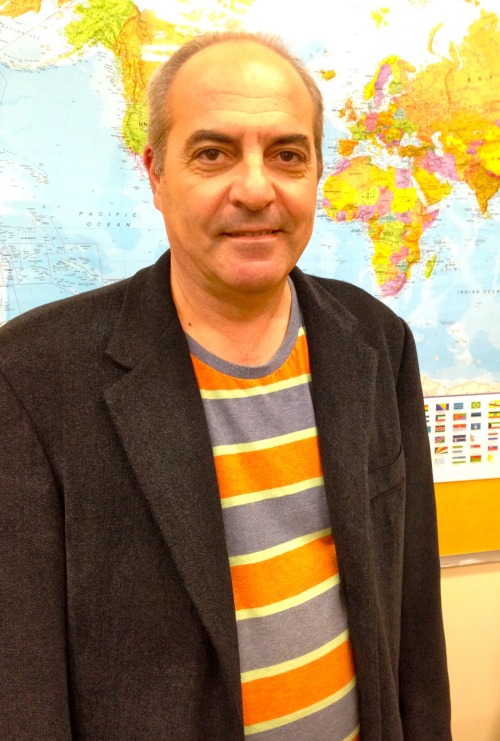#global soul
Michel Schtakleff was born and raised in Beirut, Lebanon, but his parents were Bulgarian and Palestinian, He came to America not by choice, but in fear of becoming the next civilian casualty of the growing Israeli-Palestinian civil war. Prior to then, Michel enjoyed Lebanon very much, and did not want to leave.
“One other really disturbing moment for me, that I will never forget is that of New Year’s celebration from ‘75 to ‘76. Everybody who had a gun, and many people had guns, militias of all kinds, decided to shoot up in the air all at the same exact time. The sky was blood red like Armageddon. Even though they were not shooting at each other but they were shooting up in the air it was a sick form of celebration. The noise was deafening and I felt sick to my stomach. It was horrific… So after that my parents said you need to go…”
Michel actually had a choice between going to Europe or the United States because he had family already in Europe and in several states in America. He decided on California, where his brother lived. While in Lebanon, Michel attended a multicultural school and was taught English. This made his adjustment to life in California easier. Rather than struggle with the language barrier, Michel found that he struggled with the idea of identity.
“I never thought of [of my identity] before I came to California. What is my identity? Where am I from? Because I used to be with people who are similar, people who are from all over the place. We didn’t ask each other where we are from, because we are from all over the place! So it doesn’t matter. When I came to California, the first question was, “Where are you from?” And I would say ‘oh, I was born in Beirut.’ And they would say, ‘Oh so you’re Lebanese?’ ‘Yes, but I am also Bulgarian, I am also Palestinian, I am also all of these different things!’”
After spending time at California Institute of the Arts, Michel and a friend decided to open their own graphic design studio focused on graphic design for websites; for “dot-commers.” They decided to relocate and start their business in Rhode Island. However, just before they opened, the dot-com sector crashed and the bubble burst, leaving them closed permanently before they even opened. Michel, despite this obstacle, enjoyed Rhode Island thus far, and decided to stay. “I didn’t want to leave Lebanon, but I never went back. Never visited, and I don’t have the desire to.”
Michel has taught classes in the arts and English as a Second Language at various colleges and schools including, Oakwood High School, Community College of Rhode Island, Bryant University, and Roger Williams University. He currently teaches English at the International Institute of Rhode Island. He now knows how much he enjoys teaching, and plans on continuing to do so in the future. Michel also creates film documentaries on various subjects.
“There is a documentary I want to produce, that is related to “Global Soul”… [Immigration] is politicized and there is such negativity and people that come here looking for work, everything is politicized and it is not helpful, especially because we are a country of immigrants. It seems like every group that comes in after 50 years, they discriminate the next group that comes in, and on and on and on. But now it is getting bad for the people who come here; there are a lot of unnecessary problems. I see it with my students. They are struggling and now they have to add it to their burden.”
Michel is a firm believer that in order to make things easier for immigrants coming to America in the future, the key is access.Michel believes that had he not had the language skills already honed before coming here, he would not have had the tools necessary to properly adapt. By giving immigrants access to the proper resources, together we can help make things easier for them.
Michel believes that he is truly fortunate that he was able to migrate to America without some of the common struggles that others face. He does not take for granted that he was able to follow his dream of being an artist, teacher, and filmmaker, despite being displaced from his home country.
“My greatest accomplishments…are ahead of me. The fact is that I am happy that I have been able to produce artwork that I can reach people and the fact that I have found out that I love teaching. And when you realize that you have something that you can offer and you enjoy it. That is the best thing that can happen. Teaching is a great thing because you are doing something and being useful.”
Written and compiled by Alice Horne, Logan Bruneau, and Rachel Backner
Post link

